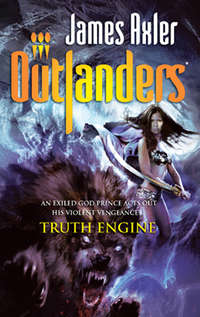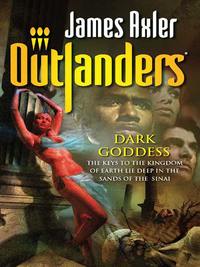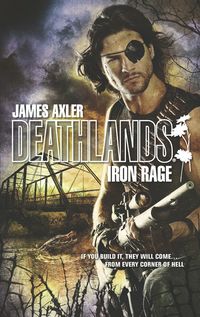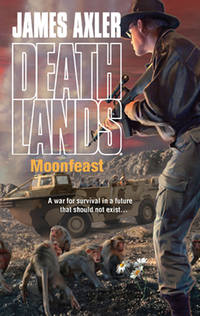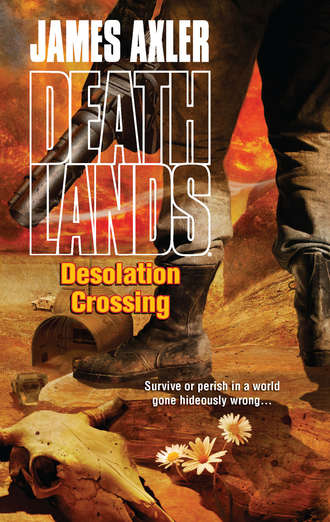
Полная версия
Desolation Crossing

One shell hit a gren
Without warning, the wag exploded with a sudden violence that took the Armorer by surprise.
And then it was over, almost anticlimactic. The convoy rolled on.
The Armorer looked at Eula, who regarded him impassively, as though the events of the firefight hadn’t occurred, as though she were examining him in minute detail, trying to get inside his head, unconcerned by what had just happened.
J.B.’s sense of unease welled up with renewed vigor. There was something odd about the whole situation, something that could spell danger not just for him, but for all the companions.
Something for which only he could find the answer—if he could figure out what the question was….
Desolation Crossing
Death Lands®
James Axler

www.mirabooks.co.uk
The only art her guilt to cover,
To hide her shame from every eye,
To give repentance to her lover,
And wring his bosom, is—to die.
—Oliver Goldsmith,
1728–1774
THE DEATHLANDS SAGA
This world is their legacy, a world born in the violent nuclear spasm of 2001 that was the bitter outcome of a struggle for global dominance.
There is no real escape from this shockscape where life always hangs in the balance, vulnerable to newly demonic nature, barbarism, lawlessness.
But they are the warrior survivalists, and they endure—in the way of the lion, the hawk and the tiger, true to nature’s heart despite its ruination.
Ryan Cawdor: The privileged son of an East Coast baron. Acquainted with betrayal from a tender age, he is a master of the hard realities.
Krysty Wroth: Harmony ville’s own Titian-haired beauty, a woman with the strength of tempered steel. Her premonitions and Gaia powers have been fostered by her Mother Sonja.
J. B. Dix, the Armorer: Weapons master and Ryan’s close ally, he, too, honed his skills traversing the Deathlands with the legendary Trader.
Doctor Theophilus Tanner: Torn from his family and a gentler life in 1896, Doc has been thrown into a future he couldn’t have imagined.
Dr. Mildred Wyeth: Her father was killed by the Ku Klux Klan, but her fate is not much lighter. Restored from predark cryogenic suspension, she brings twentieth-century healing skills to a nightmare.
Jak Lauren: A true child of the wastelands, reared on adversity, loss and danger, the albino teenager is a fierce fighter and loyal friend.
Dean Cawdor: Ryan’s young son by Sharona accepts the only world he knows, and yet he is the seedling bearing the promise of tomorrow.
In a world where all was lost, they are humanity’s last hope….
Contents
Chapter One
Chapter Two
Chapter Three
Chapter Four
Chapter Five
Chapter Six
Chapter Seven
Chapter Eight
Chapter Nine
Chapter Ten
Chapter Eleven
Chapter Twelve
Chapter Thirteen
Chapter Fourteen
Chapter Fifteen
Chapter Sixteen
Chapter Seventeen
Chapter Eighteen
Chapter Nineteen
Chapter One
“A hard rain’s going to fall,” Doc muttered gnomically from the rear of the wag.
Mildred looked at him, also hard. The reference was lost on the others; but she, of an earlier age than them, wondered if some memory had once more filtered through Doc’s labyrinthine and fogged mind.
Jak looked up at the clear sky above them and sniffed. “No rain. Not for too long…”
The sky was azure, the sun burning red-yellow as it passed its peak and they entered the afternoon. The heat seemed to bounce off the ground around them and radiate back up, meeting itself so that it created a haze of shimmering air that held them tight. The land surrounding the wag on all sides was barren for as far as they could see, a chiaroscuro of browns that disappeared into the false horizon of the heat haze. It was dotted here and there by patches of stark cacti, rising up freakishly as though a part of the land was reaching to the sky in search of escape. To their rear, diminishing steadily with the rhythmic turning of the wag’s engine, lay the hellhole from which they had just departed.
“Rain, sun, who gives a shit as long as this damn engine doesn’t stall,” Ryan said through gritted teeth, grinding the gears as he ground his teeth.
J.B. and Krysty exchanged glances. Ryan had been in a foul mood since they had acquired the wag. Stranded in a pesthole that went by the name of Stripmall, they had been short of jack, short of supplies and short of work. Like others they had encountered in these wastes, the ragged-assed ville had been devoted to one primary industry: a gaudy house of large proportions, designed to service the trading convoys that had to make the arduous trek across the dustbowl lands.
There were many old malls that had been adapted in this way, and each followed the same basic pattern: the old storefronts had been converted into display cabinets for the girls and services within. Each held a different type of woman, displayed a different kind of pleasure. All tastes were catered to. And with the friends devoid of any kind of currency, there had been a tacit pressure exerted on the men to push Mildred and Krysty into work. After all, mutie women with prehensile hair were always at a premium, and there were few black women in this area of the Deathlands. Both of them represented a novelty, which made them potentially high earners.
And when Ryan and J.B., in particular, had paid no heed to the imprecations; when Millie and Krysty had made their own opinions known forcefully—the proprietor of one gaudy house now nursed two broken arms—it had become obvious that the choice to say no would soon be removed. So they had made it their business to get the hell out of the ville as soon as possible. A catalog of bad luck had landed them in Stripmall, and it hadn’t got much better when they had been forced to trade what little they had left for a broken-down wag. It was cumbersome, too big for their needs and made a noise as if a dozen stickies were being chewed up in the pistons.
But it would serve its purpose. They hoped.
The wag was a big yellow school bus, the padding long since disintegrated or ripped away from the uncomfortable metal seats. The suspension was shot to hell. That wouldn’t have mattered on the kinds of roads that it had originally been built to traverse, but the road out of Stripmall was little more than the beaten remains of a highway, more pothole and debris than smooth surface. Even the tarmac that remained was in a sticky, semiviscous state because of the heat. So the bald tires dragged, bumped and slewed across the surface.
The steering was also shot, each crevice, bump and deviation in the surface wrenching the wheel in Ryan’s hands, tearing at the muscles in his forearms. It was less than comfortable on his buttocks, too, as the combination of poor road surface and even worse suspension catapulted him toward the ceiling of the wag with monotonous regularity. Back in the seats, spread down the length of the bus, the other friends found themselves bounced around like ball bearings, rattling with the same force against the sides of the bus.
To make it worse, Ryan was starting to get the feeling that they had been gypped over the amount of fuel in the wag. It was impossible to get an accurate reading as the fuel gauge was broken, and even though they had watched the toothless, scrawny guy they had bartered with fill the tank from battered gas cans, there was no way of knowing what the consumption of the beast may be—Ryan was beginning to fear it was a damn sight less than they had figured.
Stripmall vanished into the haze of the horizon, and now they were surrounded by nothing but dust, blue and cacti that looked uncannily as if they were moving across the ground. It was as though the companions were isolated from the rest of the world, with nothing but the whine and strain of the engine and the bone-jarring impact of the road to occupy their minds.
Which was perhaps why Doc’s mind was starting to wander again. Drivel to most, but to Mildred something that struck an associative chord.
“We are just desolation angels on the road,” he intoned softly, staring out the back window, his voice hiccuping in time to the jolting of the vehicle.
“Say what?” Krysty asked.
Doc looked around, his eyes barely registering that she was there for a fraction of a second before recognition returned to them.
“Did I say something?” he asked, dreamily.
“Something but nothing,” Jak muttered, “same usual.”
Mildred ignored them, and asked, “Where did you get that from, Doc?”
The old man looked puzzled for a second, then remembrance crossed his face and he grinned slyly. “It may have been during my subterranean life, or perhaps when I was on satori in Paris,” he answered.
Mildred’s face split into a grin. “I have seen the best minds of my generation ripped apart…no, torn apart…is that it?”
Doc raised an eyebrow. “Something like. I fear your memory may be as faulty as mine, my dear Doctor. Which is something that does not, perhaps, bode well for the future. Immediate or long-term.”
“It has been a long time, Doc. Both for us, and for the rest of what’s left of the world. I know I remember that from high school. We had a progressive teacher who wanted us to read more than just the syllabus in Lit classes. Not just Frost, but the Beats, as well. That was how I came across them. But you?”
Doc frowned for a moment, as though struggling to pull out a memory that sought to elude him, remaining just that touch out of reach. Then his face lit up as he was able to grasp it.
“It was when I was taken from my home, and deposited in that purgatory that existed before the purging fire of skydark. Though it has birthed this wasteland, I suspect that it could not have been that much better in many ways. The stench of corruption always filled my senses back when…But where was I? Ah yes, the road dreams of Kerouac and Cassady. The endless journeying, with no destination in sight and no real goal other than to move on. Perhaps there was an object once. Perhaps, at one time, there was a point to the interminable road. But somewhere along the line that became lost, and to keep moving was the only goal. What is it, I wonder, that has bought that back to me…Come to that, was the whole thing allegory or metaphor, or was it just the ultimate realization of the dream to be free?”
“Dream you talk sense one day,” Jak muttered almost to himself.
“Doc,” Mildred said softly, “I asked you how you knew about the Beats and Dylan.” She turned to Krysty and J.B., who had been trying to follow the discussion with varying degrees of enthusiasm. After all, there was nothing but the land and sky outside to occupy them.
“The Beats,” Mildred explained, “were a late twentieth-century group of writers, and Dylan was a singer and poet who wasn’t part of them, but was kinda like them. All long after Doc was a young man.”
“I disagree,” Doc replied with a sudden and surprising vehemence. “I was still a young man. I am still a young man. That which you see is not the real me, but what their meddling has made of me. And yet…” He calmed down, grew more reflective. “And yet they were not all bad. There were some who were interested only in the experiments, and found themselves at the behest of those who had power and money. One of them, a doctor called Seeger, was not a bad man, just a misguided one who was out of his moral depth. He consoled himself by reading the books he had treasured as an idealistic student, by listening to the recordings that had fired him on. I recall asking him why he had chosen his path. He grew by turns angry and morose, but in the latter state he was able to give me at least some kind of answer.”
“What did he tell you?” Krysty asked, fascinated by this small glimpse of a time she had not seen.
“He said that fate has a way of snatching our dreams and hopes, distorting them in its breeze, tangling them the way that the string of a kite gets tangled by the winds. He said that roads that we travel are not as signposted as we think, and that even if we think that the past has escaped us, for better or for worse, it still has a way of sneaking up, tapping us on the shoulder, and reminding us that those things we thought long since buried have a bearing on where we are now, whether we should like this or not.”
“So was he right?” Krysty asked again.
Doc’s face creased into a rueful grin that held more melancholy than joy. “He is long since dust, and I am here. How can I ask him?”
“Come to that, would he have a better answer than any of us?” Mildred murmured.
Doc’s face creased a little more. “My dear Dr. Wyeth, a doctor of philosophy you should have been.”
Mildred was sure it was a half quote from something else that she should have known. She was trying to recall the source when her attention was taken by a more pressing matter. Jak had moved past J.B., Krysty and Mildred, and was now on the backseat next to Doc, staring out of the back window.
Doc turned and faced the rear, trying to follow Jak’s gaze. In the unfathomable manner he had of snapping from reverie to an alert present, he could tell that the albino youth had caught wind of something on their tail.
“What is it, lad? I cannot see,” he muttered.
“Not see,” Jak replied softly. “Hear, feel. Different buzz under wag noise. Feeling road change. Not much, but enough. Bastard heat,” he added. Doc knew what he meant: the heat mist that obscured the true horizon, and bought a curtain down between them and Stripmall, limited their field of vision. If something was approaching, then it was not yet near enough to pierce that curtain, yet how much time would that cost them?
Even without the eerie miasma of the heated air, the motion and erratic progress of the wag would have made it difficult to discern what—if anything—had been in their wake. But such was the level of trust felt by Ryan Cawdor in the judgment of the albino hunter that he barked an order for the friends to be on triple red for whatever was about to approach them. And such, indeed, was the level of trust felt by the rest of the companions that they had already unsheathed weapons before the words had fallen from Ryan’s lips.
J.B. moved forward to keep an eye on anything that could approach from the front of the vehicle: although it was unlikely, Ryan could do little to recce, his eye being riveted to the treacherous road surface directly ahead of them. J.B. could act as a roaming pair of eyes, just in case.
But in truth they knew that any danger would come from the rear. Mildred and Krysty were halfway down the bus, one on each side of the center aisle, arms curled painfully tight around steel seat supports to give them as much stability as was possible, sight intent on the wastes that stretched on each side, but the bias of their vision directed to the rear, where Jak and Doc were tight against the back window, as if the mere act of this could somehow force their hidden enemy to show themselves.
Enemy? Maybe not: but considering they had left Stripmall in some hurry, and that the women were highly prized by those who ran the gaudy houses, it was a fair assumption. A safe assumption. And better safe than chilled.
The progress of the old school bus became that bit more tortuous, the road that bit more treacherous: at least, that was how it seemed as translated through the steering grip of Ryan Cawdor. Maybe it was tension. Maybe the road really had worsened. It didn’t matter: all that counted was that it was that little bit harder to cling on and keep rattling eyeballs in focus.
“Nearer,” Jak murmured. He spoke low, but his voice carried to them with the authority of one who was never wrong. None of the others could distinguish the sounds he could hear, but they knew he was right.
They waited….
As though in slow motion and as though materializing from nothing, the pace of the pursuing vehicles caused them to shimmer and take shape as they broke the distance barrier and penetrated beyond the heat haze. There were three of them: two low-slung wags, like old cars that had been cut down and opened out to allow the shooters easy access and aim. Not that they would need it, judging from the size of the side-mounted machine blasters, each of which looked as though their weight could drag the vehicle to one side without the counterbalance of their opposite mounting.
The third vehicle was a motorbike bearing two men, the man on pillion carrying what looked to be a rocket launcher.
“Ryan, would it perhaps be possible to squeeze a little more pace from this vehicle?” Doc queried. “I fear they are starting to gain with some rapidity, and will soon be able to test their range.”
Ryan couldn’t look round—the road was in bad shape. But he knew one thing for certain. “It doesn’t matter how quick they are, or what kind of firepower they’ve got. There’s no way I can squeeze any more speed from this bastard. We’re gonna have to fight.”
Doc had suspected as much, but figured it was worth asking the question. Too much speed and the Lord alone knew how much precious fuel they would waste. Too much speed and the Lord was equally the only one who would have any notion of how the wag would stand up to the road surface.
Besides, it was too late to worry now. The bike had streaked ahead of the two wags that had previously flanked it, and the pillion rider had risen to his feet, swaying with the movement of the bike as he raised the rocket launcher and took aim.
“Bastard,” Jak hissed, his tone saying far more than just the word itself could convey. As the roar of the discharged launcher reached them, a fraction of a second be hind the muzzle-flash and the unsteady swaying of the pillion rider, the recoil kicking back at him, Ryan had already hauled the wheel to the right, taking them to the edge of the ruined blacktop and onto a dusty soil that was almost harder and surer than the road they had left.
The rocket hit the road about a hundred yards ahead of them, where they would have reached in moments, and where the impact of detonation would have shattered the glass of the windshield into Ryan’s good eye, in all likelihood bringing chunks of rock, soil and softened blacktop with it.
Instead, the impact—now lessened by distance—hit them broadside. Krysty yelped involuntarily as she ducked, slivers of shattered window glass raining on her with some rock and soil. The side of the bus sounded as though it had been pelted with stones, but the damage was minimal.
Jak had already beaten out the glass of the back window with the butt of his Colt Python pistol, and had the barrel centered on the pillion rider, who was reloading while still standing. It was a neat trick, but stupe. With his attention on the rocket launcher, he wasn’t looking at the bus. The rider was, and made to move the bike to one side. But he was hampered by the need to keep the balance of his passenger, and he wasn’t quick enough. Jak snapped off one shot from the .357, the sound of the blaster almost deafening within the confines of the bus, despite the noise out side.
Jak had a hunter’s aim. The pillion rider flew backward as the round hit him, the velocity of the impact multiplied by the forward motion of the bike. A red mist of blood spread around him.
The bike sheered as the rider attempted to cope with the sudden shift in weight and balance presented to him. He was good, but not good enough to deal with both this and the treacherous road surface. The front tire of the bike blew out on something unseen, and the bike slewed viciously out of control, the rider dragged underneath as the weight and momentum pulled it to one side. His torso had been bare, and he was in moments little more than a red slick on the road.
Simultaneously, fate had smiled on the friends. The pillion rider—now minus half of his viscera and quite chilled—had flopped back into the road, causing one of the wags to swerve to avoid hitting him. This attempt to keep hot on the trail would have proved successful, if not for the fact that the rocket launcher that the pillion rider had been carrying had parted company from his lifeless grip and skittered across the road and into the path the wag had taken to evade impact.
It merely swapped one for another; one of a deadlier effect. The front of the wag and the rocket launcher met with an impact that caused the detonation of the explosive that the pillion rider had been in the throes of loading. The resultant explosion rocked the air, causing the remaining wag to skid and veer across the surface of the road wildly before righting itself and continuing the pursuit.
IT GAVE RYAN a little more time to try to pilot the cumbersome wag across the hardpacked earth. It was bouncing and veering less than on the road, but it was still bone-shaking, and difficult for anyone to aim well.
The pursuing wag was almost on them, the machine blasters chattering and tracers of fire kicking up around them. The whine and clang of shots striking home were also a little too close for comfort. Short of stopping, there was little Ryan could do to give his companions a break when it came to return fire.
But maybe he could slow the opposition a little, and use the fact that the wag was large and cumbersome to its advantage. Without even thinking about it, he had been heading away from the ruined road, and had come within distance of one of the groups of eerie cacti that dotted the landscape.
He realized why he had been doing this, and without pause hauled the heavy steering column around so that the old school bus was headed straight for the center of the cacti. As they neared it, he could see that the plants were much larger, much taller than they had appeared from a distance. The actual span of the patch had to have been about 150 yards, and the plants themselves had thick bases at least six feet around. They needed them, if they were to support the branching arms of thick spikes that sprouted on all sides, reaching upward in mute supplication.
Despite the distances and sizes involved, there was no way that he could get the bus through the maze they made without crashing into them.
Good. That was his plan.
“Away from the windows,” he yelled.
Considering they were about to engage the enemy, it may have struck his people as a strange thing to say. One glance ahead told them why. They were in the aisle of the bus within moments.
Ryan slewed the bus into the middle of the cactus patch. The big yellow bus hit big yellow and green stalks that were as hard as wood. The front fender crunched, the headlights splintered, but the bus barged through, knocking some cacti over at a drunken angle, toppling others completely. Sap spurted and dribbled from branches taken off by the impact of the large wag.
The old school bus left a path in its wake, but one that was scattered with spikes like nine-inch nails, trails of sap and listing and fallen trunks.
The wag on their tail had been gaining all the time. The driver was hunched over the wheel, trying to keep a steady path so that the two blasters on either side—both manned—could lay down a barrage, which they had started to do as soon as the school bus had come in range. Their fire had taken out what was left of the back windows, and peppered the hide of the bus with dents and small holes. But they hadn’t accounted for the fact that the old buses were built like tanks, for long and hard use. The main body of the vehicle could stand a lot more pounding than most nontrading wags the machine blasters were used to firing on.



